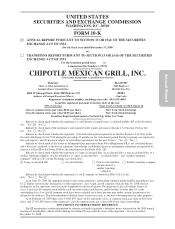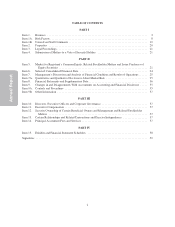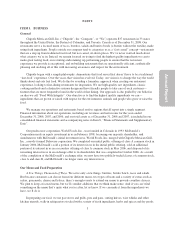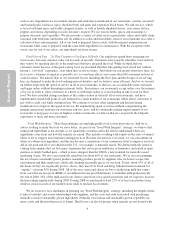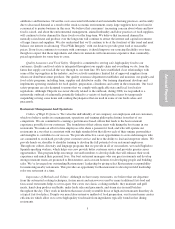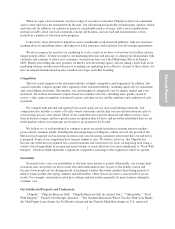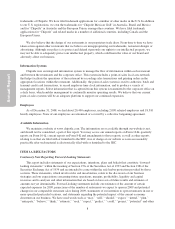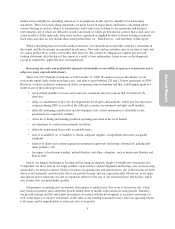Chipotle 2008 Annual Report Download - page 13
Download and view the complete annual report
Please find page 13 of the 2008 Chipotle annual report below. You can navigate through the pages in the report by either clicking on the pages listed below, or by using the keyword search tool below to find specific information within the annual report.
Our failure to manage our growth effectively could harm our business and operating results.
Our plans call for a significant number of new restaurants. Our existing restaurant management systems,
financial and management controls and information systems may be inadequate to support our expansion.
Managing our growth effectively will require us to continue to enhance these systems, procedures and controls
and to hire, train and retain restaurant managers and crew. We also are restructuring our field management
structure, in part due to our recent rapid growth. We may not respond quickly enough to the changing demands
that our expansion will impose on management, crew and existing infrastructure, and changes to our operating
structure may result in increased costs or inefficiencies that we cannot currently anticipate. Changes as we grow
may have a negative impact on the operation of our restaurants, and cost increases resulting from our inability to
effectively manage our growth could adversely impact our profitability. We also place a lot of importance on our
culture, which we believe has been an important contributor to our success. As we grow, however, we may have
difficulty maintaining our culture or adapting it sufficiently to meet the needs of our operations. Our failure to
foster and maintain our corporate culture could also harm our business and operating results.
Changes in food and supply costs could adversely affect our results of operations.
Our profitability depends in part on our ability to anticipate and react to changes in food and supply costs.
Like all restaurant companies, we are susceptible to increases in food costs as a result of factors beyond our
control, such as general economic conditions, seasonal fluctuations, weather conditions, demand, food safety
concerns, generalized infectious diseases, fluctuations of the U.S. dollar, product recalls and government
regulations. The cost of many basic foods for humans and animals, including corn, wheat, rice and oil increased
over the past year. This has resulted in upward pricing pressures on almost all of our raw ingredients including
chicken, beef, tortillas and rice, and although some prices eased somewhat near the end of 2008, we expect
pricing pressures to generally continue in 2009. We have also had a significant increase in the cost of rice, soy oil
and sweet corn as a result of the renewal of pricing protocols for those items at the end of the third quarter of
2008. Any increase in the prices of the ingredients most critical to our menu, such as beef, chicken, cheese,
avocados, beans, rice, tomatoes and pork, could adversely affect our operating results. Alternatively, in the event
of cost increases with respect to one or more of our raw ingredients, we may choose to suspend serving menu
items, such as guacamole, rather than paying the increased cost for the ingredients. Any such changes to our
available menu may negatively impact our restaurant traffic and comparable restaurant sales.
Instances of food-borne or localized illnesses could cause the temporary closure of some restaurants and
result in negative publicity, thereby resulting in a decline in our sales, or could adversely affect the price and
availability of the meat or produce we use to prepare our food.
Instances of food-borne illnesses, real or perceived, whether at our restaurants or those of our competitors,
could result in negative publicity about us or the restaurant industry, which could adversely affect sales. For
instance, during 2008 a small number of Chipotle restaurants were associated with separate outbreaks of
customer illness, and even in markets in which we were never proven to be the cause of the illnesses our sales
were adversely impacted. If our customers become ill from food-borne or localized illnesses, we could be forced
to temporarily close some restaurants. A decrease in customer traffic as a result of these health concerns or
negative publicity, or as a result of a change in our menu or dining experience or a temporary closure of any of
our restaurants, could materially harm our business.
In addition, reports linking a nationwide outbreak of salmonella during the summer of 2008 to a variety of
fresh produce items caused us to temporarily suspend serving some produce items in our foods or to otherwise
alter our menu. Similarly, past outbreaks of e. coli relating to certain food items caused consumers to avoid
certain products and restaurant chains, Asian and European countries have experienced outbreaks of avian flu,
and incidents of “mad cow” disease have occurred in Canadian and U.S. cattle herds. These problems, other
food-borne illnesses (such as hepatitis A or trichinosis) and injuries caused by food tampering have had in the
past, and could have in the future, an adverse affect on the price and availability of affected ingredients. If we
11
Annual Report


